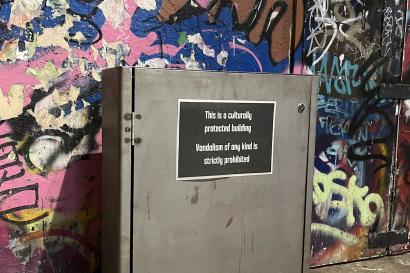
On Wednesday, March 11, I turned 21. I was so excited to turn 21 in Germany, even though the age is not as significant as in the United States. It still felt like reaching a milestone in a special way, and what better place to celebrate than Berlin?
Over the next two days, two of my friends from my home university were supposed to visit me. I had already planned out what sights I’d show them, what I’d tell them, and where we would eat. It was an opportunity to show them what I loved about Berlin, celebrate my birthday, and how far we had all come.
My birthday itself was lovely, apart from a slight mishap: I didn’t have my passport. I came home from classes and looked everywhere, but realized that I might have left it in Hamburg, where I had been the past weekend with IES Abroad. My host mom helped me call the hostel I stayed at and politely demanded, as only a mother can, that they recheck the room and the lost and found. I racked my brain for anywhere else it could be. Suddenly, I realized that I had gone to LIDL for groceries on Monday, and knowing me, I probably hadn’t transferred my passport back to its safe place after going to Hamburg. Sure enough, after visiting the LIDL, the confused workers brandished my passport. Okay! Problem solved, or should I say, problem avoided.
Now to the celebration! My classmates sang happy birthday to me in class, much to my amusement, and my host mother prepared a lovely setup: tulips, chocolates, office supplies (my favorite) and a book about Berlin. “It’s in English and German, so you can show your family and always remember us,” she said. Little did I know how much that book would come to mean in the next 24 hours. Do you sense a theme here?
In the evening, one of my friends and I went to an amazing Greek restaurant in Rosenthaler Platz. Afterward, I went to the Deutsches Theater with a class to see “The Ugly Duckling”, a fascinating show about identity, drag, and expression. I could not have asked for a better pairing of my interests for my birthday.
At 4 a.m. on Thursday, March 12, I woke up to a buzzing phone and a missed call from one of my friend who was supposed to visit me. “Dude look at the news and your email,” she wrote. President Trump had just announced that due to the spread of COVID-19, the United States would not be allowing non-U.S. citizens from Europe to enter the country via international flights past Friday, March 15. I immediately called my parents, who were already in bed. We quickly realized that even though the order didn’t apply to U.S. citizens, flight prices would only skyrocket along with the health risk of increasingly crowded airports and customs and immigration lines. There were already hardly any flights in the afternoon available, and Friday would be crowded. In fact, we had to pay for a round trip because it was hundreds of dollars cheaper than a one-way ticket. (We didn’t use the second flight.)
We settled on a flight from Berlin Tegel at 9:30 a.m., which meant I had now about 2 hours to pack up everything I owned and get to the airport early enough for an international flight. Luckily, my host mom got up in the middle of the night, helped me pack my clothes (even the ones still drying from the previous day’s laundry) and drove me to the airport. We cried and hugged and prayed and promised that this would not be the end of our relationship, nor the end of my story with Berlin.
Over the next 24 hours, I went from plane to airport to plane to airport to car to home, but not at all how I had imagined a few months ago. Really, none of us could have imagined this. It was an incredible disappointment, especially to have studied a country’s language and culture for so long only to leave too soon. It was also an incredible privilege. I would not trade the short time I had in Berlin for anything. It proved to me that I could communicate on a daily basis only in German, I could be confident in my skills, and that I could feel comfortable in the place I had dreamed about.
As I take online classes along with thousands of other study abroad students and millions of regular university students sent home, I am grateful to still have an education. It brings me joy to hear my professors talk in German about what they love while sitting in my very not German household in the middle of nowhere, Ohio. I understand why this has to happen. A pandemic is a very serious thing, and even now at home, the more preventative measures we take, the safer we will be. I’m grateful to be in a state where this crisis is taken seriously, though it pains me a bit to hear the country’s arguments about protecting people, medically and economically. Already I know several people in critical condition from “the coronavirus,” many more suffering from loss of income and health insurance, and I’m sure this will only grow.
This puts my sorrow in perspective, although I know I am still allowed to mourn the abrupt ending of something I put my whole heart into. I could dwell on the ending, or I could enjoy that not only did I have a wonderful time in Berlin, but out of all days, my last day was my birthday. What a beautiful way to send a bittersweet Auf Wiedersehen to Berlin, and it’s a true Auf Wiedersehen—I’ll see you again.

Sarah Ross
<p>I am a junior at American University in Washington, D.C. studying Foreign Language and Communications Media with tracks in German and Public Relations. I am passionate about German punk music, linguistics and its relation to power, LGBTQ+ experiences internationally, strong coffee, and exploring my surroundings through creative outlets. I have previously lived abroad as a child and am excited to be back in Europe. I am also on a mission to pet every animal possible- join me!</p>






